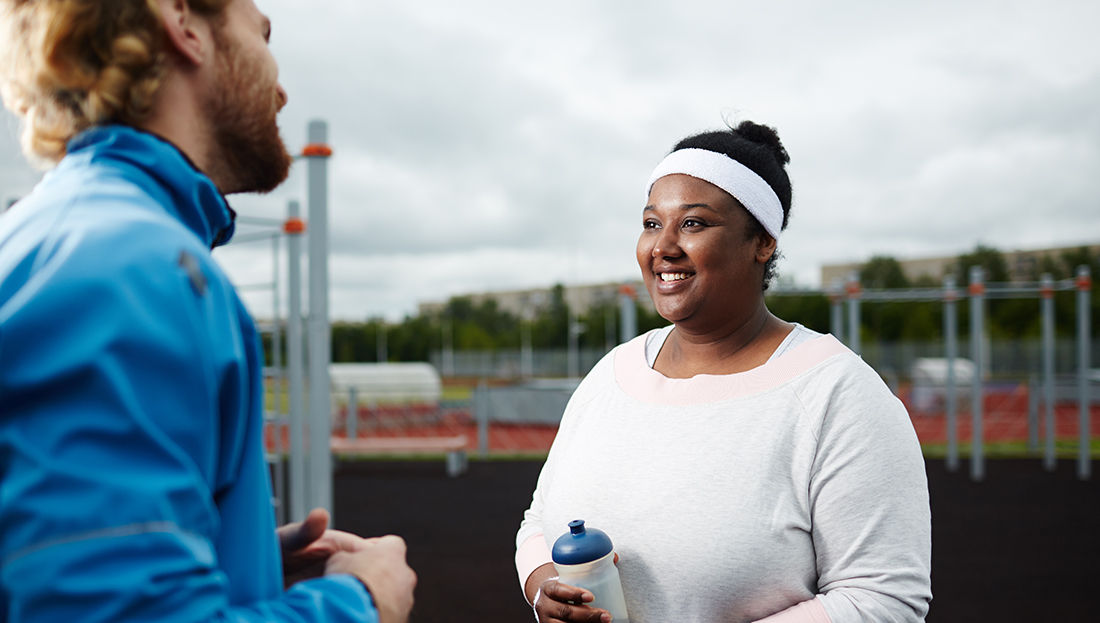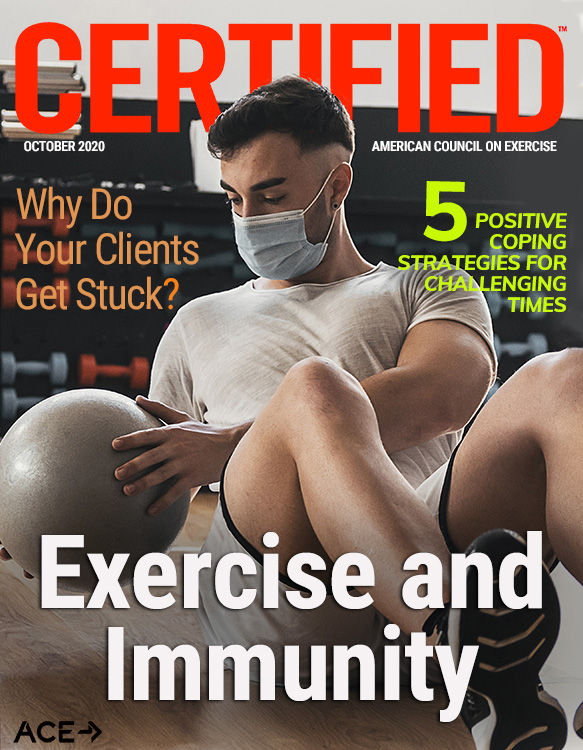
Research Review: The Link Between Obesity and COVID-19 Complications

From COVID-19 risk to recovery, emerging research suggests that the odds are stacked against those with underlying conditions, such as diabetes and heart disease; older individuals also have proven to be more vulnerable. Now, a recent review of COVID-19 studies led by the University of North Carolina at Chapel Hill has revealed a troubling connection between two health crises: coronavirus and obesity.
Researchers examined the available published literature on individuals infected with the virus and found that those with obesity [body mass index (BMI) over 30 kg/m2] were at a greatly increased risk for hospitalization (113%), more likely to be admitted to the intensive care unit (74%) and had a higher risk of death (48%) from the virus.
A team of researchers at UNC-Chapel Hill’s Gillings School of Global Public Health, including lead author Dr. Barry Popkin, a professor in the Department of Nutrition and member of the Carolina Population Center, collaborated with senior author Meera Shekar, a World Bank health and nutrition specialist, on the paper published in Obesity Reviews.
For the paper, researchers reviewed immunological and biomedical data to provide a detailed layout of the mechanisms and pathways that link obesity with increased risk of COVID-19 as well as an increased likelihood of developing more severe complications from the virus. Obesity is already associated with numerous underlying risk factors for COVID-19, including hypertension, heart disease, type 2 diabetes, and chronic kidney and liver disease.
Metabolic changes caused by obesity—such as insulin resistance and inflammation—make it difficult for individuals with obesity to fight some infections, a trend that can be seen in other infectious diseases, such as influenza and hepatitis. During times of infection, uncontrolled serum glucose, which is common in individuals with hyperglycemia, can impair immune cell function.
“All of these factors can influence immune cell metabolism, which determines how bodies respond to pathogens, like the SARS-CoV-2 coronavirus,” explains co-author Melinda Beck, professor of nutrition at Gillings School of Global Public Health. “Individuals with obesity are also more likely to experience physical ailments that make fighting this disease harder, such as sleep apnea, which increases pulmonary hypertension, or a body mass index that increases difficulties in a hospital setting with intubation.”
Previous work by Beck and others has demonstrated that the influenza vaccine is less effective in adults with obesity. The same may be true for a future SARS-CoV-2 vaccine, says Beck.
“However, we are not saying that the vaccine will be ineffective in populations with obesity, but rather that obesity should be considered as a modifying factor...for vaccine testing,” she said. “Even a less-protective vaccine will still offer some level of immunity.”
Roughly 40% of Americans have obesity and the pandemic’s resulting lockdown has led to a number of conditions that make it harder for individuals to achieve or sustain a healthy weight.
Working from home, limiting social visits and a reduction in everyday activities—all in an effort to stop the spread of the virus—means many people are moving less than ever, says Popkin.
“We’re not only at home more and experience more stress due to the pandemic, but we’re also not visiting the grocery store as often, which means the demand for highly processed junk foods and sugary beverages that are less expensive and more shelf-stable has increased,” Popkin explains. “These cheap, highly processed foods are high in sugar, sodium and saturated fat and laden with highly refined carbohydrates, which all increase the risk of not only excess weight gain but also key noncommunicable diseases.”
What the Research Means to Health and Exercise Professionals
As a health and exercise professional, it is important to stay up to date on current research findings and equally important to be able to apply what you learn to the work you do. This transfer and application of knowledge is vital for sharing accurate information from reliable sources and for designing evidence-based personalized exercise programs. Given the current pandemic, it is particularly important that you take the time to help your clients understand the connection between COVID-19 and obesity.
Of course, talking about overweight and obesity with your clients can be incredibly challenging. "It is essential to be respectful, show empathy for your client and to first ask their permission beforing broaching the subject," urges Dr. Cedric X. Bryant, ACE President and Chief Science Officer. "For example, you might ask, 'Can we have a conversation about weight?' If they agree, you can start to share some information about the risks that may be posed by their excess weight."
To help you navigate these types of conversations with clients, what follows is a sample case study demonstrating how you can use the ACE Mover MethodTM and ACE ABC ApproachTM to guide a client toward change. In this example, during the "break down barriers" step, the health coach uses a simple strategy for information exchange called elicit-provide-elicit to discover what the client is interested in learning more about, to provide clear and relevant information and to ask if the client understands the information.
Case Study: How to Talk About the Connection Between COVID-19 and Obesity
During an initial virtual coaching session, a highly motivated new client lets you know that they recently met with their primary care physician for a routine telehealth appointment and learned that their health status had changed since their last appointment one year ago. While these health changes are not immediately life-threatening, they are important to the client, who has been very cautious and concerned about their health since the onset of the COVID-19 pandemic.
Ask: During this step, powerful open-ended questions are used to uncover what the client wants to achieve by working with a health coach and to keep the discussion moving in a positive direction.
Health Coach: Thank you for taking the time to meet with me to discuss your behavior-change goals. What specifically are hoping to achieve by working with a health coach?
Client: You’re welcome. Lately, my health has become more of a priority for me since the COVID-19 pandemic has impacted so many aspects of my life. While I do not have COVID-19, I would like to do all I can to minimize my risks. I follow all the state-mandated guidelines in my area, and I wonder if there is anything else I could be doing to protect myself. Also, I recently met with my doctor and they let me know that, in general, my health has changed. For many years, I have been gaining weight and my blood pressure and cholesterol levels have been elevated. Now I found out that my blood sugar levels are high as well. At this most recent appointment, my doctor said that I officially have hypertension, prediabetes, high cholesterol and a BMI score that indicates that I have obesity. Hearing all this information was scary for me, especially to find all of this out now during a pandemic. After the initial shock, I decided I want to take control of my health and would like to begin with becoming more physically active. I would like to work together with you to become more active.
Health Coach: Improving your health is important to you and becoming more physically active is a good place to start. What types of physical activity do you enjoy?
Client: It has been a long time since I have participated in any physical activity. Also, over the past few months, I have been moving less and less now that I am working from home and not commuting to work. At this point, I am not even walking from the parking lot to my office. In the past, I enjoyed walking and even riding my bike, but I honestly could not tell you how long it has been since I went for a walk or a bike ride.
Break Down Barriers: During this step, more open-ended questions can be used to discover what potential barriers may get in the way of the client reaching their specific goals.
Health coach: What is currently preventing you from adding more physical activity to your daily routine?
Client: At this point, I am feeling a little overwhelmed about where to begin and I feel like I have several questions that would help inform and motivate me to make healthier decisions. For example, I understand that having obesity has many health challenges, but I don’t know if it has anything to do with COVID-19.
Health Coach: You are feeling overwhelmed about where to begin and having answers to some questions may help you to feel less overwhelmed. You said you would like to know more about obesity and the connection with COVID-19. What specifically would you be most interested in knowing more about?
Client: Does having obesity increase my chances of getting COVID-19?
Health Coach: Great question! Recent research shows that some of the underlying risk factors for COVID-19 are some of the same risk factors for obesity. Those risk factors include hypertension, high cholesterol and type 2 diabetes. Also, having obesity can make you more susceptible to acute respiratory distress syndrome, or ARDS, which is the main cause of COVID-19 mortality. In other words, COVID-19 and obesity share some of the same risk factors and having obesity may make you more likely to have ARDS. Does that make sense?
Client: Yes. Thank you!
Health Coach: What else?
Client: Does COVID-19 affect people with obesity differently?
Health Coach: Another good question! Having obesity can make the effects of COVID-19 more severe in that it can increase the need for hospitalization and treatment within intensive care units. Research shows that having obesity increases the odds of being hospitalized, and can increase the severity of, and the risk of death from, viral respiratory infections such as COVID-19. Does that make sense?
Client: I did not realize that having obesity can increase the severity and risk of death from COVID-19. This conversation has been informative. Thank you.
Health Coach: Anything else?
Client: You have answered all of my questions for now about obesity and COVID-19. This also made it clearer to me that I am going to start being more active. I know becoming more active is good for me no matter what. To be honest, even before the pandemic I was thinking about being more active but the updates to my health status and the connection between obesity and COVID-19 are enough of a reason for me to finally get started.
Collaborate: This step is all about collaboration as the client and health coach work together to decide on the next steps and SMART goals.
Health Coach: Having the information you need has helped you decide to get started. What does becoming more physically active mean to you?
Client: Being more physically active to me means spending less time sitting and more time being up and moving. I currently do no physical activity, so any amount would be an improvement. During my telehealth doctor’s appointment, my doctor supported my desire to be more active. I mentioned earlier that I used to enjoy riding my bike and walking and I think walking would be a good place to start.
Health Coach: Sitting less and moving more by including walking in your daily routine is where you would like to begin. Being as specific as possible, how will you reach this goal?
Client: This has been on my mind for the past two weeks and I have already purchased a new pair of sneakers to get started. The community I live in is very walkable and yet there is so much of it that I have not explored. I can walk outdoors and practice social distancing right outside my front door. I plan to schedule breaks on my work calendar and to walk during those breaks. Each break will be 15 minutes long and I plan to walk for 15 minutes on Monday, Wednesday and Friday during my 11:00 am break for the next two weeks. If this goes well, I think I could do more but accumulating 45 minutes of walking each week for the next two weeks is where I would like to begin.
While every client interaction is unique, this sample exchange demonstrates how you can use the ACE Mover Method and the ACE ABC Approach to broach the connection between COVID-19 and obesity and discuss it with a client in a nonjudgmental manner that respects their autonomy and acknowledges their resourcefulness and ability to change.
Although the research on COVID-19 is emerging, with new (and sometimes contradictory) findings published continuously, you have the opportunity to serve as a source of credible information for your clients. To that end, we’ve created a “cheat sheet” of the latest findings related to obesity and COVID-19 for ACE Certified Professionals (you can access it via the link at the top of this page), which you can share, as appropriate, with your clients.





 by
by 

